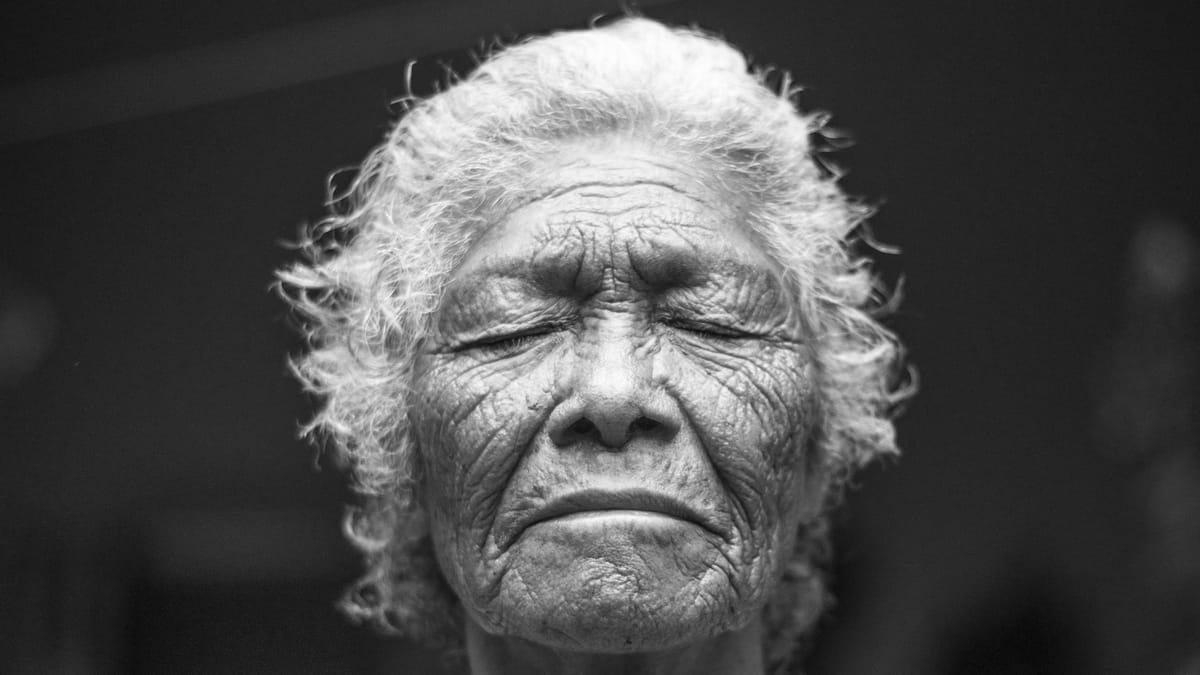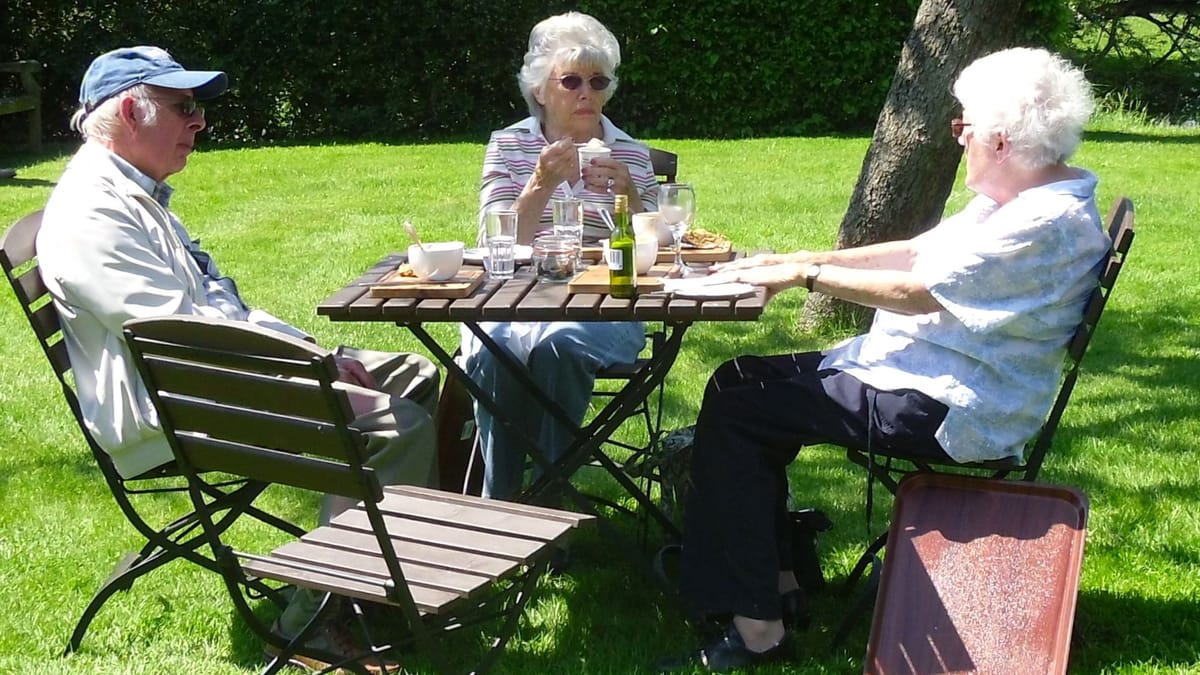Understanding Dementia: Stages, Symptoms, and Steps for Caregiving
Navigating the early stages of dementia can be difficult for both the person diagnosed and their loved ones. This guide provides tips and resources for caregivers to understand the changes and support their loved one through the journey.

Ayre writes,
My wife and I have been married for over 55 years. My wife was recently diagnosed with dementia at 81 years old. I am 86 years old.
I have no idea what to expect and what steps I need to take to prepare for providing care for her. There is so much uncertainty with this diagnosis.
Ayre,
I am deeply sorry to hear about your wife's recent dementia diagnosis. Please don't hesitate to reach out if you have any questions or need support as you navigate this challenging journey.
Your heartfelt question highlights the emotional and practical challenges many families face when a loved one is diagnosed with dementia. First, let me commend your dedication to your wife and your proactive approach to understanding her condition.
Navigating dementia can feel overwhelming, but gaining knowledge about its stages, symptoms, and care strategies can help ease the journey.
To help you get started, here is a link offering valuable tips for providing care during these early stages:
I Have Dementia: What Do I Need to Do Now?
Warm Regards,
Diane Carbo RN
I have provided you more information to support you on your caregiving journey.
What Is Dementia?
Dementia is an umbrella term for various brain disorders that lead to progressive cognitive decline, affecting memory, problem-solving, language skills, and daily living. While Alzheimer’s disease is the most common type, other forms include vascular dementia, Lewy body dementia, frontotemporal dementia, and mixed dementia. Each type manifests unique symptoms, but all share the common thread of affecting brain function and quality of life.
Stages of Dementia
Dementia typically progresses through seven stages, but these are often grouped into three broader categories:
1. Early Stage (Mild Dementia or Mild Cognitive Impairment)
- Symptoms: Memory problems, difficulty recalling recent events, trouble with problem-solving, and mild impairment in routine tasks.
- Steps to Take:
- Consult with health professionals to confirm a dementia diagnosis.
- Engage in a healthy diet and physical activities to support brain health.
- Encourage participation in community programs to promote mental stimulation.
- Prepare legally and financially by discussing care preferences and creating advance directives.
2. Middle Stage (Moderate Dementia)
- Symptoms: Increased memory loss, mood swings, difficulty communicating, and challenges with everyday tasks such as cooking or managing finances.
- Steps to Take:
- Collaborate with a health care team to manage dementia symptoms.
- Ensure home safety by reducing hazards and providing clear routines.
- Seek support from the Alzheimer’s Association or local caregiver groups for practical advice and emotional relief.
- Monitor health conditions such as high blood pressure or sleep disturbances that can exacerbate symptoms.
3. Late Stage (Severe Dementia)
- Symptoms: Severe cognitive and physical decline, including loss of language skills, inability to perform routine tasks, and dependency on caregivers.
- Steps to Take:
- Focus on comfort care and maintaining dignity.
- Engage in gentle physical activities to support physical abilities.
- Work closely with your health care team to address sleep disturbances, mood swings, and symptoms affecting memory and mobility.
Stages of dementia will help you plan for the future
Preparing for Caregiving
As a caregiver, especially at 86, your role is vital but must be balanced with self-care. Here are steps to consider:
Build a Support Network
- Involve family members to share caregiving responsibilities.
- Reach out to local or online support groups for caregivers. Organizations like the Alzheimer’s Association and Alzheimer’s Society provide resources tailored to families.

Understand Her Unique Needs
- Every person’s dementia progresses differently. Pay attention to your wife’s symptoms and health conditions, including whether her diagnosis involves rare brain disorders like Creutzfeldt-Jakob disease, Huntington's disease, or normal pressure hydrocephalus.

Plan for the Future
- Explore options for professional care, such as in-home services or memory care facilities, to prepare for severe dementia stages.
- Discuss finances, insurance, and legal documents with an elder law attorney or financial advisor.
Promote Quality of Life
- Engage in activities your wife enjoys, such as music or light exercise, to maintain her connection to life.
- Create a predictable daily routine to reduce confusion and anxiety.
Recognizing Risk Factors and Prevention
While you cannot reverse dementia, understanding risk factors such as family history, traumatic brain injuries, and lifestyle habits can guide preventive measures for other family members. For example:
- Healthy Diet: Focus on brain-supportive foods rich in antioxidants and omega-3 fatty acids.
- Regular Check-Ups: Monitor for high blood pressure, vitamin deficiencies, and conditions like mild cognitive impairment.
Common Symptoms and What to Expect
Dementia symptoms typically progress, affecting memory, physical abilities, and communication. In later stages, symptoms may mimic conditions such as amyloid plaques in Alzheimer’s disease or nerve cell damage seen in Lewy body dementia. You may notice difficulty performing routine tasks, sleep disturbances, and mood changes.
Lean on Professional Help
Your health care team is your ally in this journey. They can provide guidance on managing dementia-like symptoms, blood tests for related conditions, and ensuring both of you receive adequate support.
Preparing for Caregiving: Steps to Ensure Comprehensive Support
Caregiving is both a privilege and a challenge, particularly when caring for a spouse with dementia. At 86, your caregiving role is crucial, but sustaining your own well-being is equally important. This guide provides actionable steps to balance care for your wife while safeguarding your health, utilizing a range of proven caregiving strategies.
Build a Support Network
Caregiving requires a team approach to ensure your wife’s needs are met without overwhelming you. Here’s how to build a solid care team:
Create a Care Team Partner Support Group
- Engage Family Members: Invite siblings, children, or close relatives to share caregiving responsibilities. Clearly outline roles based on their availability and strengths.
- Involve Friends or Neighbors: Trusted friends can help with small tasks like grocery shopping, transportation, or companionship.
- Professional Support: Consider caregiving coaching or care management services. These professionals can provide expert advice on navigating dementia care effectively.
Leverage Local and Online Support Resources
- Reach out to organizations like the Alzheimer’s Association and Alzheimer’s Society, which offer tailored caregiver resources.
- Participate in caregiver support groups, either locally or online, to share experiences and gain emotional support.
- Investigate community programs, such as adult day care centers, which can provide structured activities for your wife and give you respite.
Understand Her Unique Needs
No two dementia journeys are the same. Developing a Person-Centered Care Profile can help ensure your wife’s care is customized to her evolving needs.
Develop a Person-Centered Care Profile
- Track Symptoms: Document her dementia symptoms, such as memory problems, mood swings, or difficulty communicating.
- Assess Health Conditions: Include any co-existing conditions like high blood pressure, mild cognitive impairment, or rare brain disorders such as Creutzfeldt-Jakob disease or normal pressure hydrocephalus.
- Identify Preferences: Record her favorite activities, foods, and music, as well as triggers that cause anxiety or agitation.
- Monitor Changes: Regularly update the profile as her condition progresses to middle stage or late stage dementia.
This profile can guide caregivers, family members, and health professionals in providing consistent, meaningful care.
Plan for the Future
Proactive planning is essential to navigate the unpredictable nature of dementia. Preparing for advanced stages now can reduce stress later.
Explore Professional Care Options
- Caregiving Coaching: Learn strategies to manage daily challenges and adapt as the disease progresses.
- Care Management: Professionals can coordinate medical appointments, therapies, and other services to ensure continuity of care.
- Adult Day Care and In-Home Services: These programs provide structured activities and socialization, offering you much-needed breaks while ensuring your wife is well cared for.
- Memory Care Facilities: For advanced stages of dementia, explore memory care facilities equipped to handle severe cognitive and physical decline.
Legal and Financial Planning
- Work with an elder law attorney to create or update legal documents, such as power of attorney, healthcare proxies, and estate plans.
- Discuss Advanced Directives: Ensure her preferences for medical interventions and end-of-life care are documented.
- Review finances and insurance policies with a financial advisor to prepare for potential long-term care costs.
Promote Quality of Life
Maintaining your wife’s connection to life and her surroundings can enhance her overall well-being.
Engage in Meaningful Activities
- Music Therapy: Songs she enjoys can help stimulate memory and lift her mood.
- Light Exercise: Activities like walking, stretching, or chair exercises can improve her physical abilities and emotional state.
- Creative Outlets: Encourage art, crafts, or puzzles adapted to her ability level.
Establish a Predictable Routine
- Create a daily schedule that includes meals, exercise, and rest periods at consistent times. Predictability reduces confusion and anxiety.
- Incorporate activities from her Person-Centered Care Profile into the routine, ensuring her day feels familiar and fulfilling.
Self-Care for You as a Caregiver
Caring for your wife is an act of love, but it’s vital to care for yourself too:
- Take breaks using respite services like adult day care or temporary in-home care.
- Stay physically active with light exercises like walking or yoga.
- Share your experiences with caregiver support groups to reduce feelings of isolation.
Common Symptoms and What to Expect in Dementia Progression
Dementia affects people differently, but it typically involves a gradual decline in memory, physical abilities, and communication. Understanding the progression of symptoms and what to expect can help caregivers and family members prepare for the changes ahead. Here’s a detailed look at the symptoms and their impact over time, based on the progression of the disease.
Early-Stage Symptoms (Mild Dementia or Mild Cognitive Impairment)
In the early stages, symptoms are subtle and may be mistaken for normal aging. Early detection and intervention during this stage can help slow progression.
Common Symptoms:
- Memory Problems: Forgetting recent events, appointments, or where items were placed.
- Difficulty Problem-Solving: Trouble managing finances, following recipes, or solving everyday problems.
- Language Challenges: Searching for words or having difficulty finding the right term during conversations.
- Mood Swings: Increased irritability, depression, or anxiety.
- Sleep Disturbances: Changes in sleep patterns, such as difficulty falling asleep or staying asleep.
What to Expect:
- Routine tasks may take longer to complete, requiring patience and support.
- Family members may start noticing unusual behaviors, such as repeating questions or getting lost in familiar places.
Middle-Stage Symptoms (Moderate Dementia)
As dementia progresses, symptoms become more noticeable and disruptive, requiring greater assistance in daily living.
Common Symptoms:
- Significant Memory Loss: Difficulty recalling recent events or personal details, such as their address or family members’ names.
- Communication Issues: Struggles with speaking coherently or understanding what others are saying.
- Mood and Behavioral Changes: Increased agitation, paranoia, or mood swings. Some may exhibit symptoms similar to those seen in brain disorders like Lewy body dementia, including hallucinations or delusions.
- Physical Changes: Decreased coordination, difficulty walking, and problems with balance.
- Sleep Disturbances: Worsened insomnia or a reversed sleep-wake cycle, leading to nighttime wandering.
What to Expect:
- Assistance with routine tasks such as dressing, bathing, and cooking becomes necessary.
- Family members may notice symptoms that mimic conditions like amyloid plaques in Alzheimer’s disease, which impair memory and thinking, or nerve cell damage seen in Lewy body dementia, which affects movement and cognition.
- The risk of falls and accidents increases due to declining physical abilities and coordination.
Late-Stage Symptoms (Severe Dementia)
In the final stages of dementia, there is a severe decline in physical and cognitive abilities, leading to near-total dependence on caregivers.
Common Symptoms:
- Severe Memory Loss: Inability to recognize familiar people, including family members.
- Loss of Communication Skills: May only respond to non-verbal cues or simple phrases.
- Physical Decline: Loss of mobility, trouble swallowing (dysphagia), and incontinence.
- Mood Changes: Persistent confusion, anxiety, or withdrawal.
- Health Complications: Increased vulnerability to infections like pneumonia and bedsores due to reduced mobility.
What to Expect:
- Full-time care is required to assist with basic needs like feeding and toileting.
- Symptoms may overlap with other brain disorders, such as Creutzfeldt-Jakob disease or advanced stages of Huntington’s disease, leading to unpredictable behaviors and health complications.
- Palliative care or hospice may become necessary to ensure comfort and dignity.
Additional Symptoms and Considerations
Throughout the stages, dementia symptoms may include:
- Difficulty Performing Routine Tasks: From managing medications to remembering how to use household appliances.
- Sleep Disturbances: These may be linked to changes in circadian rhythms or conditions like normal pressure hydrocephalus.
- Mood Swings and Anxiety: Particularly in unfamiliar environments or situations.
What Caregivers Can Do
As dementia symptoms progress, caregivers can take specific steps to provide effective support:
- Monitor Symptoms: Keep track of changes in memory, mood, and physical abilities.
- Promote Safety: Make the home environment dementia-friendly by removing trip hazards, installing locks on doors, and setting up a predictable routine.
- Engage in Activities: Simple tasks, like listening to music or sorting familiar items, can provide comfort and stimulation.
- Seek Professional Help: Consult health professionals to address challenges like sleep disturbances or swallowing difficulties.
Final Thoughts
Dementia’s progression affects every aspect of life, from memory and problem-solving to physical health and communication. While the symptoms evolve over time, understanding what to expect can help caregivers prepare and respond compassionately.
By anticipating changes and leveraging resources from organizations like the Alzheimer’s Association, caregivers can ensure a higher quality of life for their loved ones and maintain their own well-being throughout the journey.
More information on dementia and care:
We have created a playlist on Dementia and dementia care
















